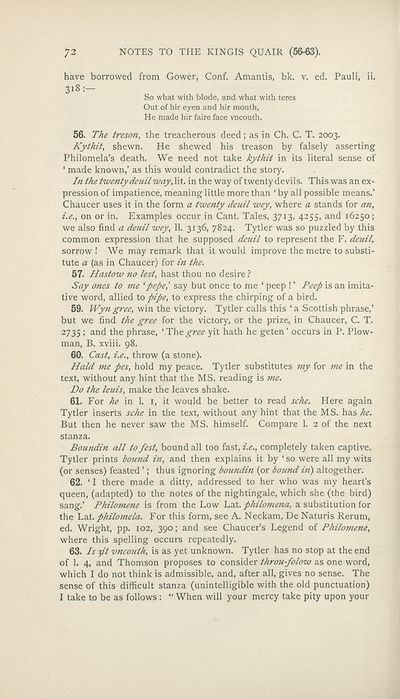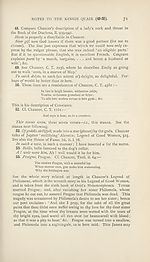Download files
Complete book:
Individual page:
Thumbnail gallery: Grid view | List view

72 NOTES TO THE KINGIS QUAIR (56-63).
have borrowed from Gower, Conf. Amantis, bk. v. ed. Pauli, ii.
318:—
So what with blode, and what with teres
Out of hir eyen and hir mouth,
He made hir faire face vncouth.
56. The treson, the treacherous deed; as in Ch. C. T. 2003.
Kythit, shewn. He shewed his treason by falsely asserting
Philomela’s death. We need not take kythit in its literal sense of
‘ made known,’ as this would contradict the story.
In the twenty deuil way,Y\t. in the way of twenty devils. This was an ex¬
pression of impatience, meaning little more than ‘ by all possible means.’
Chaucer uses it in the form a twenty deuil wey, where a stands for an,
i.e., on or in. Examples occur in Cant. Tales, 3713, 4255, and 16250;
we also find a deuil wey, 11. 3136, 7824. Tytler was so puzzled by this
common expression that he supposed deuil to represent the F. deuil,
sorrow! We may remark that it would improve the metre to substi¬
tute a (as in Chaucer) for in the.
57. Hastow no lest, hast thou no desire ?
Say ones to me ‘pepe,' say but once to me ‘ peep ! ’ Peep is an imita¬
tive word, allied to pipe, to express the chirping of a bird.
59. Wyn gree, win the victory. Tytler calls this ‘a Scottish phrase,’
but we find the gree for the victory, or the prize, in Chaucer, C. T.
2735 ; and the phrase, ‘ The gree yit hath he geten’ occurs in P. Plow¬
man, B. xviii. 98.
60. Cast, i.e., throw (a stone).
Hald me pes, hold my peace. Tytler substitutes my for me in the
text, without any hint that the MS. reading is me.
Do the leuis, make the leaves shake.
61. For he in 1. 1, it would be better to read sche. Here again
Tytler inserts sche in the text, without any hint that the MS. has he.
But then he never saw the MS. himself. Compare 1. 2 of the next
stanza.
Boundin all to fest, bound all too fast, i.e., completely taken captive.
Tytler prints bound in, and then explains it by ‘ so were all my wits
(or senses) feasted ’; thus ignoring boundin (or bound in) altogether.
62. ‘ I there made a ditty, addressed to her who was my heart’s
queen, (adapted) to the notes of the nightingale, which she (the bird)
sang.’ Philomene is from the Low Lat. philomena, a substitution for
the Lat. philomela. For this form, see A. Neckam, De Naturis Rerum,
ed. Wright, pp. 102, 390; and see Chaucer’s Legend of Philomene,
where this spelling occurs repeatedly.
63. Is yt vncouth, is as yet unknown. Tytler has no stop at the end
of 1. 4, and Thomson proposes to consider throu-folow as one word,
which I do not think is admissible, and, after all, gives no sense. The
sense of this difficult stanza (unintelligible with the old punctuation)
I take to be as follows: “ When will your mercy take pity upon your
have borrowed from Gower, Conf. Amantis, bk. v. ed. Pauli, ii.
318:—
So what with blode, and what with teres
Out of hir eyen and hir mouth,
He made hir faire face vncouth.
56. The treson, the treacherous deed; as in Ch. C. T. 2003.
Kythit, shewn. He shewed his treason by falsely asserting
Philomela’s death. We need not take kythit in its literal sense of
‘ made known,’ as this would contradict the story.
In the twenty deuil way,Y\t. in the way of twenty devils. This was an ex¬
pression of impatience, meaning little more than ‘ by all possible means.’
Chaucer uses it in the form a twenty deuil wey, where a stands for an,
i.e., on or in. Examples occur in Cant. Tales, 3713, 4255, and 16250;
we also find a deuil wey, 11. 3136, 7824. Tytler was so puzzled by this
common expression that he supposed deuil to represent the F. deuil,
sorrow! We may remark that it would improve the metre to substi¬
tute a (as in Chaucer) for in the.
57. Hastow no lest, hast thou no desire ?
Say ones to me ‘pepe,' say but once to me ‘ peep ! ’ Peep is an imita¬
tive word, allied to pipe, to express the chirping of a bird.
59. Wyn gree, win the victory. Tytler calls this ‘a Scottish phrase,’
but we find the gree for the victory, or the prize, in Chaucer, C. T.
2735 ; and the phrase, ‘ The gree yit hath he geten’ occurs in P. Plow¬
man, B. xviii. 98.
60. Cast, i.e., throw (a stone).
Hald me pes, hold my peace. Tytler substitutes my for me in the
text, without any hint that the MS. reading is me.
Do the leuis, make the leaves shake.
61. For he in 1. 1, it would be better to read sche. Here again
Tytler inserts sche in the text, without any hint that the MS. has he.
But then he never saw the MS. himself. Compare 1. 2 of the next
stanza.
Boundin all to fest, bound all too fast, i.e., completely taken captive.
Tytler prints bound in, and then explains it by ‘ so were all my wits
(or senses) feasted ’; thus ignoring boundin (or bound in) altogether.
62. ‘ I there made a ditty, addressed to her who was my heart’s
queen, (adapted) to the notes of the nightingale, which she (the bird)
sang.’ Philomene is from the Low Lat. philomena, a substitution for
the Lat. philomela. For this form, see A. Neckam, De Naturis Rerum,
ed. Wright, pp. 102, 390; and see Chaucer’s Legend of Philomene,
where this spelling occurs repeatedly.
63. Is yt vncouth, is as yet unknown. Tytler has no stop at the end
of 1. 4, and Thomson proposes to consider throu-folow as one word,
which I do not think is admissible, and, after all, gives no sense. The
sense of this difficult stanza (unintelligible with the old punctuation)
I take to be as follows: “ When will your mercy take pity upon your
Set display mode to: Large image | Zoom image | Transcription
Images and transcriptions on this page, including medium image downloads, may be used under the Creative Commons Attribution 4.0 International Licence unless otherwise stated. ![]()
| Publications by Scottish clubs > Scottish Text Society publications > Old series > Kingis quair > (132) |
|---|
| Permanent URL | https://digital.nls.uk/106994059 |
|---|
| Description | A collection of over 100 Scottish texts dating from around 1400 to 1700. Most titles are in Scots, and include editions of poetry, drama, and prose by major Scottish writers such as John Barbour, William Dunbar, Gavin Douglas, and George Buchanan. Edited by a key scholarly publisher of Scotland's literary history, and published from the late 19th century onwards by the Scottish Text Society. Available here are STS series 1-3. |
|---|

